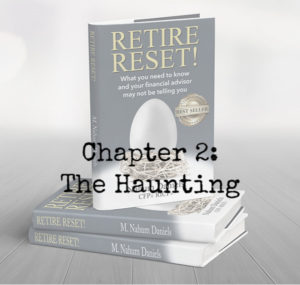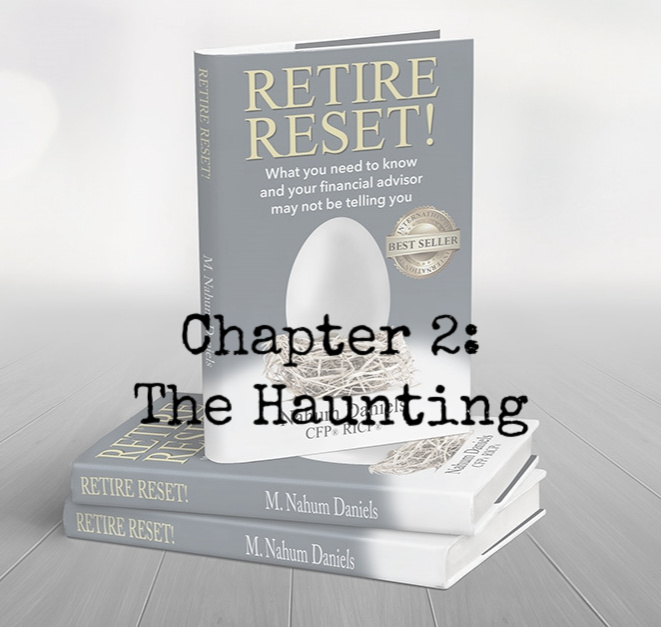
By Nahum Daniels, CFP®, RICP®
If you’ve been wondering about the book I wrote, RETIRE RESET!, we are publishing some excerpts every month right here on our blog so that you can learn more. Along the way, you will learn why our firm, Integrated Retirement Advisors, was founded: we’re on a mission to help people with retirement! Here is an excerpt from Chapter 2.
Chapter 2: THE HAUNTING
I remember my surprise when I showed up to deliver a retirement seminar at a Connecticut country inn early one morning in the spring of 2009 to find a well-dressed Japanese couple sitting keen and alert in the very front row. While many people of Chinese, Korean and Indian descent had attended my presentations over the years, it was the first time for Japanese retirees. I secretly hoped they would request an appointment if only to share their experience as expats in the US and allow me to share my experience of living in Japan for a decade. They did, and at 10:00 am the following morning, Mr. Matsuda appeared—self-conscious, and without his wife. Aware of the custom of Japanese housewives controlling the purse strings, I confess to having been disappointed. I soon learned why they weren’t together, though, as Mr. Matsuda unburdened himself, telling me a tale that has haunted me ever since.
A Cautionary Tale
Recently retired from a major Japanese trading giant with a large New York presence, Mr. Matsuda had been living with his wife of many years in a Connecticut suburb where they raised and educated their two grown children. He graduated from a top Tokyo university and had spent his entire career as a loyal sales executive for that one firm. His wife had dutifully followed him to the States over twenty years earlier, during Japan’s booming mid-80s global expansion, to help further his career. But their relationship had grown rocky, not because of any unhappiness with America, but because of a poorly timed investment they made with her family inheritance.
After watching the Nikkei Industrial Index climb fourfold to nearly 40,000 between 1984 and 1989, Mr. Matsuda persuaded his wife that they had waited long enough for confirmation; it was time to invest in Japan’s economic prowess and surging global dominance. They had already missed the run-up from 10,000 when they could have quadrupled their money and owed it to themselves and their family to get on board the 21st Century express. So, despite the unprecedented valuation levels reached by the market’s index-leading stocks (price/earnings ratios well over 100x) and a sudden tightening of interest rates initiated by the Bank of Japan to protect the Yen, the Matsuda’s decided in late 1989 to invest Mrs. Matsuda’s $1 million inheritance—a disproportionate share of their nest egg—into Japan’s world-beating stock market. To their chagrin, and like many retail investors, they got in at just the wrong time.
Less than a year later, the bubble had burst, and the market was down 50%. Shocked, but disciplined and anticipating a rebound, they decided to stay in stocks for the long run. A relief rally to 26,000 ensued but was short-lived. They were patient, enduring the market’s ups and downs, and a rebound finally came when the market almost doubled from under 9,000 in 2003 to almost 18,000 in 2007, rekindling hope of a potential climb back to previous levels. Then came the global financial crisis. Between late 2007 and early 2009, the Nikkei average fell again by 56% to a new low of 7,428. Down 80% over 20 years, their $1 million nest egg was now worth $200,000: it would have to quintuple for them to (nominally) break even. Now older, Mr. Matsuda had recently retired on a pension nowhere near what he had been previously earning. Thinking about their long life expectancy and facing an extended retirement, the Matsuda’s were beside themselves with anxiety. That’s when they attended my seminar.
While they showed up at the inn together, it was only after Mrs. Matsuda had already read her husband the riot act. Because simply seeing his face reminded her of their financial calamity, she told him, Mrs. Matsuda declared Mr. Matsuda persona non grata in their home from 6:00 am to 6:00 pm every day. He was required to make himself scarce during the hours he would have previously been at work, so his new retirement lifestyle took the form of roaming the streets to stay out of his wife’s line of sight. Like millions of other Japanese back home, he was learning to vanish, coping alone and under the radar with the shame, despair and grief that can accompany financial calamity and tear families apart. And that saga explained Mrs. Matsuda’s absence.
At this writing, it’s almost ten years later, the Matsuda’s have since returned to Tokyo, and after nearly thirty years they watch as the Nikkei nears 22,000, just over halfway back to their entry point. Forty-five years old in 1989, they are now in their mid-70s, still waiting and hoping that their patrimony will be restored someday for their children, at least, if not to make their own retirements more comfortable. That remains to be seen. In the meantime, they have had to live with the effects of Japan’s economic stagnation—including depressed asset values—for the bulk of their adult lives.
The Matsuda’s experience has indelibly shaped my approach to retirement planning. I salute Mr. Matsuda for opening up about his predicament to me—a perfect stranger. Most of all, I am profoundly grateful to both of them for putting a human face on the lasting emotional trauma and interpersonal dislocation that can be inflicted by a shocking market crash followed by a decades-long drawdown. Grinding market losses like these can have wide ranging psychological as well as economic effects. Families—multiple generations—can be affected. Dreams crushed. Moods darkened. For me, their experience underscores that retirement portfolio planning has wide-ranging ramifications beyond mere percentage gains and losses and how important timing and loss avoidance are for ultimate success. Alas, good timing is often the result of sheer luck, while a proper respect for risk requires an accurate understanding of the mathematics of loss.
Chapter 2 Takeaways
1. Indices are unmanaged, and investors cannot invest directly in them. Unless otherwise noted, performance of indices does not account for any fees, commissions or other expenses that would be incurred. Returns do not include reinvested dividends.
2. The Japanese economy was stopped in its tracks by the age wave and to date no amount of financial engineering has been able to revive it.
3. As a consequence, the Japanese people have suffered almost three decades of lost economic opportunity—foreshadowing the secular stagnation that may overhang all industrial nations today, including our own.
4. Starting in late 1989 Japan’s Nikkei 225 Industrial Index crashed 80% and, at this writing 28 years later, has recovered just over half its peak value, even after repeated BOJ interventions.
5. A lengthy market downturn can happen here too, and has: It took the Dow Jones Industrial Average over 26 years to recover after the crash of ’29, undermining many investors who retired relying on stocks.
###
If you would like to discuss your personal retirement situation, please don’t hesitate to call our firm, Integrated Retirement Advisors, at (203) 322-9122.
If you would like to read RETIRE RESET!, it is available on Amazon at this link: https://amzn.to/2FtIxuM

